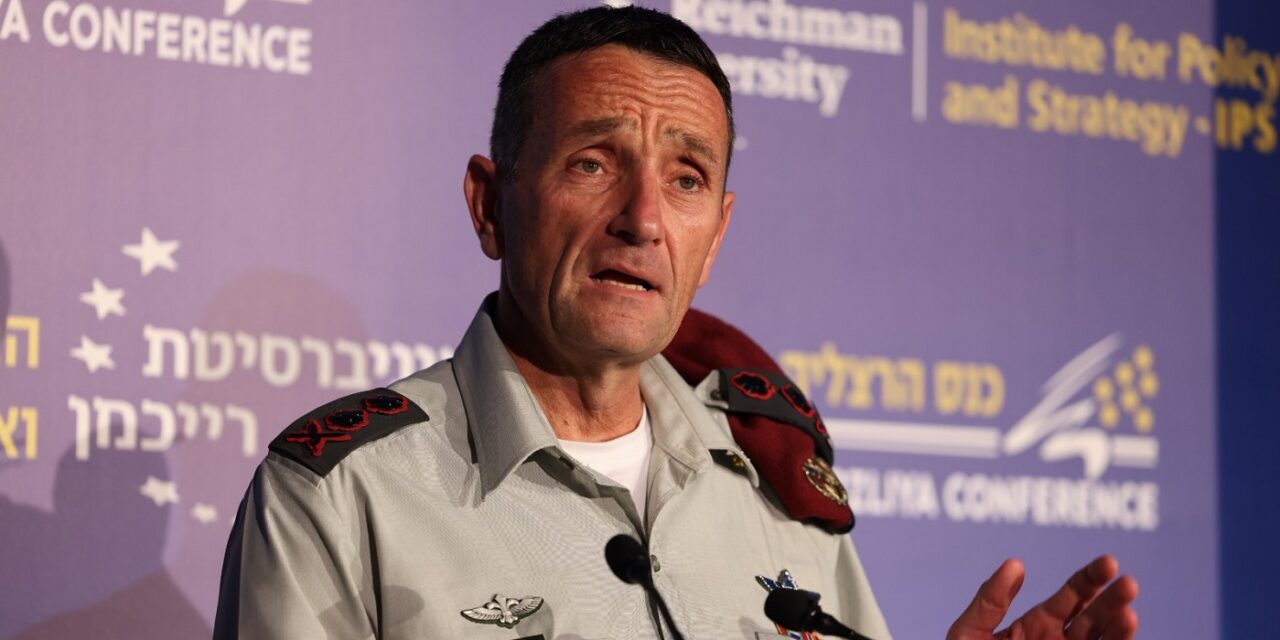Israeli leaders have warned the nation’s military to be prepared for a full-scale conflict with Iran indicating that “negative trends in Iran” could force Israel to make a preemptive military response.
Israel’s Prime Minister, Defense Minister and IDF General have each made comments this week referring to Israel’s capabilities.
Prime Minister Netanyahu said that the Israel Defense Fores have made major strides far beyond those of the nation’s adversaries despite advancements of their own.
“Israel has opened a gap against all of our enemies, and it has done so with a combination of human intelligence and artificial intelligence,” Netanyahu said following a visit to an undisclosed IDF base.
“I leave very encouraged.. What I saw here is that the future is already here today – so let all of our enemies know – we are far ahead of you,” he proclaimed.
Meanwhile Defense Minister Yoav Gallant made a separate visit to one of the Israel Air Force (IAF) bases in the south, where he received an update about successes of the recent Operation Shield and Arrow with Gaza.
“I can tell the Air Force Servicemembers, IDF troops and the people of Israel that we have in whom to trust. This Military Brach is genuinely qualitative, both its servicemembers and technologically speaking, and this combination, together with our excellent intelligence branch which brought about the wanted results during Operation Shield and Arrow,” he said.
Even though the IAF operation was impressive, Gallant emphasized that the servicemen and women must be ready to contend with a potential full-scale multi-front conflict with Iran at any given moment.
“While you successfully executed your missions in a qualitative fashion in Operation Shield and Arrow, our main goal is to prepare for a more complicated, harder and more significant mission, for which you must be prepared at any given moment,” he stressed.
IDF Chief of General Staff Lieutenant General Herzi Halevi highlighted the Israeli military’s readiness to preemptively strike Iran.
“Iran has made more progress in uranium enrichment than ever before. We are also closely examining other aspects of the [Iranians’] path to nuclear capability,” the IDF chief of staff said at a conference hosted by the Institute for Policy and Strategy of Reichman University in Herzliya.
“Without going into details, there are possible negative developments on the horizon that could prompt action,” Halevi said.
“We have abilities and others have abilities. We have the ability to hit Iran. We are not indifferent to what Iran is trying to build around us, and it is difficult for Iran to be indifferent to the line we are taking,” he added.
Halevi said Israel’s capabilities against Iran, “are good… we need to strengthen them more so that we can carry out a broad campaign against Iran.”
The military chief said that a potential war against Iran would not be conducted in the same way as a battle in a single arena. “Given a game against five players, the strength of our power will be greater.”
“Israel will not conduct itself in a multi-front war in the same manner in which it managed conflict against one sector,” he said, adding, “We have very powerful capabilities that include many powerful tools, and when a multi-sector war versus three or five actors emerges, our use of force will be substantially higher and very sharp, because such a scenario will be more complicated, and this matter will be a fundamental change in preparations for such a conflict.”
Among the various scenarios that Halevi cited involved the Iranian proxy, Hezbollah. However, he explained how the terror group’s leader Hassan Nasrallah has clearly been avoiding any open conflict over fear it would be overwhelmed by the IDF.
On Hezbollah, the IDF chief said the Iran-backed Lebanese terror group was “very deterred from an all-out war against Israel.”
“[Hezbollah] thinks it understands how we think. This thought brings it to dare and challenge us where it is sure it will not lead to war. I see this as a good way to create surprises if necessary,” Halevi said.
“We have good preparedness in the northern arena. A campaign in the northern arena will be difficult on the home front. We will know how to deal with it, but it will be difficult. It will be seven times harder for Lebanon, and even more so for Hezbollah,” he added.
Another actor is Syria, Halevi continued to explain.
“In recent months there has been a phenomenon in the region in which countries are getting closer to Iran. I don’t think that this emanates from these countries trusting Iran or truly aspiring for a peace treaty, nor do they believe that this is viable. I think that this is rooted in efforts to alleviate tensions in the region and to try avoiding greater conflicts – a choice of countries,” said the Israeli General, while pointing out that every country that allied itself with Iran has ultimately turned into a failed state without a future.
“We are not indifferent to this. I would remind [Syrian president] Bashar Assad of one very interesting fact in an era where data is being talked about: The countries that clung to Iran became failed states. If he wants to build after the civil war, let him take that to heart,” he said.
Halevi also highlighted how the Iranian hostilities are coinciding with an intensification of global competition.
“When we observe the global powers, we can see an intensifying competition especially between the United States and China. We can observe China keenly enhancing its footprint in our region, in a more substantive manner. When we look at our neighborhood, we observe Iran – which isn’t a power, but rather a large country” that is “engaged in a competition of civilizations,” he asserted.
Affirming the US as Israel’s most important strategic ally, Gen. Halevi nevertheless vowed that the Jewish State “must build and know how to take matters into its own hands, while we also want partners which are stronger than us – including the United States in particular.”
Source: TV7 and Times of Israel

This year, we want to do more to bless Israel and the Jewish people.
We know that as we bless Israel this year, God will bless us, just as He promised in Genesis 12:3, “I will bless those who bless you, and whoever curses you I will curse; and all peoples on earth will be blessed through you.” Now is the time to bless Israel and the Jewish people.









